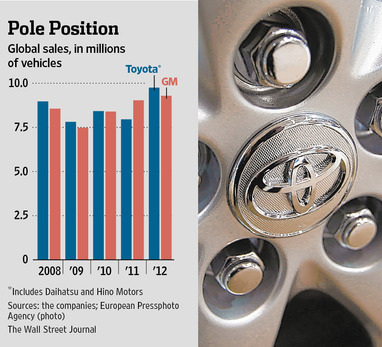Japan relies heavily on the importation and exportation of goods and services to support itself. Due to its lack of domestic resources, Japan has been uniquely forced to reach out to other nations for support in its consumption habits. For example, Japan relies on foreign imports for ninety-six percent of its primary energy needs, and the nearly ninety percent of imported oil comes from the middle east ("Japan's energy supply," 2010). To counteract its high dependence on foreign products, Japan exports many different goods and services. Japan has fairly significant industries to help balance its resource needs- the automotive and electronic goods industries both provide monetary support to the Japanese economy. Japan produced an astounding 9,942,793 vehicles to be sold worldwide in 2012 alone ("Production and export,"2013). Attesting to Japan's substantial automotive industry, Toyota was the world's largest auto maker in 2012 (Dawson, 2013). According to The Wall Street Journal, Toyota sold two million vehicles in the United States alone- a statistic that displays Japan's large reliance on exportation (Dawson, 2013). Below is a comparison of Toyota's manufacturing statistics in regards to General Motors'
Japan's technological industry is a significant monetary force in the nation. In fact, the sale and trade of consumer electronics accounts for around a third of Japan's economic output (Hays, 2009). Electronic companies such as Sony and Hitachi sell products worldwide and the exportation of their products helps support the Japanese economy. Additionally, many Japanese companies produce eighty percent of the components that are used in the manufacturing of products like the iPod (Hays, 2009). This illustrates that where Japan lacks in domestic resources, it counteracts this disadvantage with the production of other goods and services the world needs.
I personally believe globalization has been both good and bad for the nation of Japan. On one hand, Japan receives resources that it desperately needs like fuel and natural gas. Without the interdependence of other nations, Japan could not possibly support its staggering consumption habits. On the other hand, Japan is at an incredible disadvantage when it comes to these resources. While it is beneficial that it receives the resources it needs, the reliance on foreign goods has certainly taken its toll on the nation's economy. Japan is currently experiencing a recession and the constant reliance on imports definitely isn't helping. With this weak economy, certain Japanese industries, like the electronic goods industry, have faced hardships. For example, products from companies like Apple have sold well in Japan and have greatly increased the competition (Hays, 2009). While I believe Japan greatly benefits from globalization because it receives the goods and services it needs, I also believe it is negatively impacted by it through forces like competition and economic hardship.
I personally believe globalization has been both good and bad for the nation of Japan. On one hand, Japan receives resources that it desperately needs like fuel and natural gas. Without the interdependence of other nations, Japan could not possibly support its staggering consumption habits. On the other hand, Japan is at an incredible disadvantage when it comes to these resources. While it is beneficial that it receives the resources it needs, the reliance on foreign goods has certainly taken its toll on the nation's economy. Japan is currently experiencing a recession and the constant reliance on imports definitely isn't helping. With this weak economy, certain Japanese industries, like the electronic goods industry, have faced hardships. For example, products from companies like Apple have sold well in Japan and have greatly increased the competition (Hays, 2009). While I believe Japan greatly benefits from globalization because it receives the goods and services it needs, I also believe it is negatively impacted by it through forces like competition and economic hardship.
Japan’s energy supply situation and basic policy. (2010). Retrieved from http://www.fepc.or.jp/english/energy_electricity/supply_situation/
Production and export summary. (2013). Retrieved from http://www.jama-english.jp/statistics/production_export/2012/130131.html
Dawson, C. (2013). Toyota again world's largest auto maker. Retrieved from http://online.wsj.com/article/SB10001424127887323375204578269181060493750.html
Hays, J. (2009). Japanese electronics industry. Retrieved from http://factsanddetails.com/japan.php?itemid=922&catid=24&subcatid=157
Production and export summary. (2013). Retrieved from http://www.jama-english.jp/statistics/production_export/2012/130131.html
Dawson, C. (2013). Toyota again world's largest auto maker. Retrieved from http://online.wsj.com/article/SB10001424127887323375204578269181060493750.html
Hays, J. (2009). Japanese electronics industry. Retrieved from http://factsanddetails.com/japan.php?itemid=922&catid=24&subcatid=157

 RSS Feed
RSS Feed